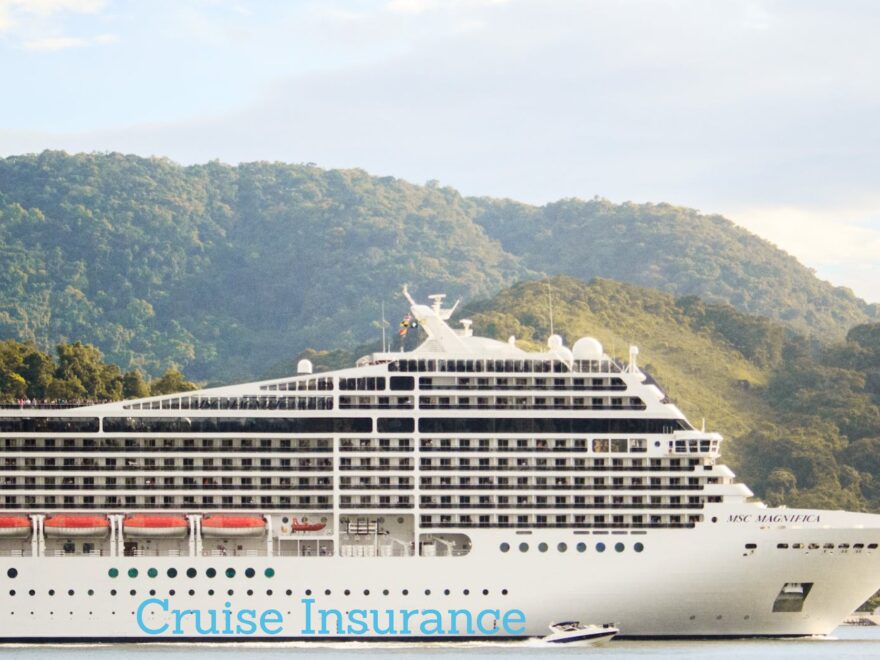Because of the unique multi-leg nature of cruise ship travel, cruise insurance is especially important to consider when booking a cruise.
Depending on the plan, cruise travel insurance can protect you if you miss a leg of your journey or need to be rescued from the sea.
When traveling by ship abroad, cruise trip insurance can provide coverage for unexpected medical issues.
It is recommended that you obtain a customized insurance quote for your cruise and compare the available plans.
[lwptoc]
What Is the Function of Cruise Insurance?
When something goes wrong on your cruise, cruise insurance can reimburse you for money you’ve already spent on the cruise as well as additional prepaid expenses like shore excursions if you need to cancel or interrupt your trip.
Think about storms delaying your arrival at your original departure port of call if you think cruise vacations can’t have problems. Or a medical emergency while on the road.
Or perhaps your luggage did not make it on the cruise with you.
Cruise insurance can help in all of these situations.
What Is Cruise Insurance Covered For?

Typically, cruise insurance will include the following coverages:
- Emergency Medical
- Emergency Medical Evacuation
- Baggage Loss or Delay
- Identity Theft
- Financial Default
- Hurricanes or Severe Weather
Emergency Medical
If you become ill or injured while on your cruise, you’ll need medical insurance to cover the costs of the treatment you receive.
Many cruisers are unaware that their home medical insurance provider may refuse to cover any care received outside of their home country, or may only cover a portion of the costs.
Travelers on international cruises with primary Medicare insurance should be especially concerned about this type of benefit, as Medicare traditionally does not cover any type of medical care outside of the United States.
Emergency Medical Evacuation
Emergency medical evacuations, while uncommon, are a real possibility for cruisers.
Whether the emergency is severe enough to necessitate an air rescue from the ship or emergency transport from the nearest port-of-call, the costs can be prohibitively expensive if not covered by insurance.
Travelers who are particularly concerned about the quality of medical care in a foreign country may want to consider the optional Hospital of Choice benefit as additional coverage.
If the attending physician determines that evacuation is medically necessary, the benefit may allow for transfer to another hospital.
Baggage Loss or Delay
There are numerous opportunities for luggage to be delayed, lost in transit, or stolen between airlines, ships, and ports of call.
Baggage loss coverage may assist in recouping the costs of replacing lost items, whereas baggage delay coverage may assist in recouping the costs of necessities purchased while waiting for bags.
Having luggage can reduce the stress of losing your belongings significantly.
Identity Theft
When on a cruise, it is possible to lose personal documents such as passports.
Identity theft protection is a one-of-a-kind service provided by some travel insurance companies.
This coverage may include a toll-free assistance line to assist you in minimizing potential damage to your credit or financial reputation.
It can also help with important communications and monitoring, allowing you to replace your documents as soon as possible and continue your cruise.
Hurricanes or Severe Weather
Naturally, cruise ships are especially vulnerable to the effects of hurricanes and other severe weather.
While most comprehensive travel insurance policies will not cover you if your cruise departs on time, they may cover you if it is canceled or cut short.
Trip cancellation insurance can assist in recouping any costs that the cruise line will not reimburse. Some cruise plans include coverage for itinerary changes or excursion cancellation due to weather conditions.
There are also important travel insurance benefits available, such as trip interruption coverage, that are related to bad weather that damages your home and renders it uninhabitable.
Financial Default
One significant advantage that third-party insurance plans provide is the possibility of financial default coverage.
In other words, if your cruise line operator or another travel supplier associated with your cruise goes bankrupt after the policy’s waiting period (typically 10 days after purchase), financial default coverage may allow you to recover the money paid to that travel supplier.
It’s important to note that financial default coverage is typically a time-sensitive benefit, so look into purchasing travel insurance as soon as you make your first trip payment.
It is critical to read the plan’s details because some restrict coverage for financial default of the travel supplier, tour operator, travel agency, organization, or firm from which you purchased the trip.
Where can I get cruise travel insurance?
When booking your cruise, you can purchase travel insurance directly from the cruise line or through your travel agent (if you’re using one, which is often a good idea when booking a cruise).
You can also go directly to a third-party travel insurance provider or aggregator site, such as InsureMyTrip.com or TravelInsurance.com. Your credit card may even provide you with some travel protection.
Here’s everything you need to know about each method of obtaining cruise travel insurance.
Companies that provide third-party insurance
AIG Travel, Allianz Travel Insurance, Travelex Insurance, and American Express Travel Insurance are examples of third-party insurance companies that specialize in writing travel insurance.
One reason to use a travel agent or a travel aggregator is that they can help you find a policy that includes cruising-specific coverage.
As previously stated, policies vary greatly. It’s a good idea to compare plans and ensure that the one you choose includes the features that are most important to you.
Travel-related credit cards
Some premium credit cards provide valuable travel protections comparable to those provided by a standard travel insurance plan.
For example, travel insurance provided when you pay for travel with certain credit cards can reimburse you for expenses if your luggage is damaged, you are stranded overnight due to a flight delay or cancellation, or you must return home to deal with a family medical emergency.
Determine whether your credit card protection includes travel accident insurance or covers pre-existing medical conditions, as well as when it will reimburse you.
Lines of cruising
Cruise lines frequently require customers who book a cruise to purchase the line’s own protection at the time of purchase.
However, if specifics about the coverage are lacking, always ask the line for details ahead of time, review coverage perks and limits, and then compare those to one or two independent travel insurance policies or the insurance benefits of your credit card.
There are some quirks in cruise line travel insurance policies. In the event of a covered cancellation, many cruise lines will only provide a travel voucher or credit for future use, rather than a full refund. Cruise line policies can also be more stringent.
What is the cost of cruise insurance?
A travel insurance policy will cost you between 4% and 8% of your total prepaid, nonrefundable trip expenses. Recognizing that this is a broad range, but it reflects the breadth of products available.
There are some basic plans that cost less than 4% of your trip costs. Some super-premium plans that cover almost every conceivable issue can cost up to 12% of your trip costs.
All reputable insurance companies will provide you with a “free-look period” during which you can get a full refund on your premium.
This enables you to review the policy you’ve chosen and return it for any reason within the time frame specified — usually for a small administration fee of less than $10.
Related Article: What insurance companies cover Uber drivers?
Under normal circumstances, unless you require the flexibility, you should not purchase a so-called cancel for any reason add-on to your cruise travel insurance policy. The upgrades are much more expensive.
Can I Purchase Travel Insurance After Booking My Cruise?
It is best to buy early, ideally after you have made your first payment toward your trip.
Some benefits, such as coverage for pre-existing medical conditions or the optional Cancel for Any Reason benefit, are time-sensitive.
And, while some plans provide post-departure benefits or can be purchased at the last minute, ideally we recommend that you begin comparing travel insurance plans as soon as possible.
Is Cruise Insurance Beneficial?
While travel insurance cannot prevent mishaps, it can alleviate the burden of unexpected expenses and additional travel arrangements that must be made with little notice.
It can protect the cost of your trip if you have a travel delay or need to cancel, offset additional expenses incurred as a result of a travel delay or lost, delayed, or damaged luggage, and protect against costly medical bills incurred while traveling abroad.
Travel insurance is a wise investment when compared to the cost of a cruise. Plans are not one-size-fits-all because prices and terms vary, but travelers should expect to pay 4% – 10% of their total, nonrefundable trip costs.
In conclusion
Cruise insurance is not for every traveler or even every sailing. It does not come cheap. However, if you’re about to set sail, it can provide a lot of peace of mind. Do your research, compare plans, and always consider the risks.
